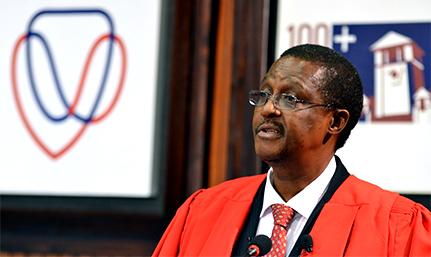|
 |
26 April 2013
Photo: Stephen Collett |
- Speech - Bram Fischer Memorial Lecture (Pdf)
The university celebrated the life and legacy of the struggle icon Bram Fischer – the Kovsie Alumnus who helped shape the landscape of South African history. The university paid homage to the anti-apartheid stalwart on 26 April 2013, hosting the first Bram Fischer Memorial Lecture with well-known academic and human rights lawyer Prof Barney Pityana as the guest speaker. Prof Pityana was joined on the Bloemfontein Campus by Fischer’s daughters Ruth Rice and Ilse Wilson and his nephew Peter.
Early in the day, the Fischer sisters honoured their father’s legacy speaking at a critical conversation hosted by the Institute for Reconciliation and Social Justice. They later joined Prof Pityana in a discussion with students where Prof Pityana spoke about the history of the South African Students Organisation (SASO) and the role of student leaders.
In his memorial later in the evening, Prof Pityana highlighted Fischer’s contribution in the struggle for justice, notably his role as lawyer in the Rivonia trial. He gave a critical evaluation of South Africa’s legal system speaking at length about accessibility and transformation of the system.
In his thank you speech Prof Johan Henning, Dean of the Faculty of Law, reminded the audience of the prominent role the Fischer family played in the history of the UFS. Fischer’s father Adv Percy Fischer was the very first law academic and founder of the Faculty of Law at the Grey University College, now the UFS. One of his earliest students was CR Swart, the first LLB graduate at the UFS. Fittingly, the inaugural lecture was hosted in the CR Swart Building, home to the Faculty of Law.